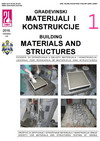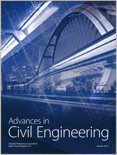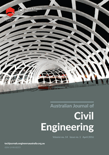
Turkish Journal of Civil Engineering
metrics 2024
Connecting Scholars to Shape the Built Environment
Introduction
Welcome to the Turkish Journal of Civil Engineering, a pioneering publication under the auspices of the TURKISH CHAMBER OF CIVIL ENGINEERS, dedicated to advancing the field of civil engineering and construction. With a focus on cutting-edge research and innovative practices, this journal seeks to provide a platform for scholars, professionals, and students to share their findings and insights within the sphere of civil and structural engineering. The journal is committed to open access, ensuring that research is readily available to a global audience. As it embarks on its journey from 2023 to 2024, it aims to enhance its reputation as a vital resource within the academic community, currently ranking in the 40th percentile for Building and Construction Engineering and 32nd for Civil and Structural Engineering in Scopus. We encourage contributions that push the boundaries of engineering knowledge, fostering collaboration and progress in this essential field.
Metrics 2024
 -
- -
- -
- -
-Metrics History
Rank 2024
Scopus
JCI (Web Of Science)
Quartile History
Similar Journals

Revista de la Construccion
Exploring Cutting-Edge Solutions in Construction EngineeringRevista de la Construcción is a pivotal academic journal dedicated to the field of civil engineering and construction, published by the prestigious Pontificia Universidad Católica de Chile, Escuela de Construcción Civil. With its ISSN 0718-915X, this journal serves as a crucial platform for disseminating innovative research, case studies, and advancements in construction methodologies that address contemporary challenges within the industry. While currently not classified as open access, it provides valuable insights benefiting researchers, professionals, and students engaged in construction development and sustainability. The journal enhances the academic discourse and contributes significantly to knowledge in engineering practices, project management, and material science. Based in Santiago, Chile, the journal aims to foster collaboration and knowledge exchange among experts both locally and globally, making it an essential resource for those striving to advance the science and practice of construction.

Gradevnski Materijiali I Konstrukcije-Building Materials and Structures
Pioneering sustainable practices in building materials and structures.Gradevnski Materijiali I Konstrukcije - Building Materials and Structures is a premier open-access journal dedicated to advancing the field of construction materials and structural engineering. Published by SOC MATERIALS & STRUCTURES TESTING SERBIA, this journal provides a platform for researchers, professionals, and students to share their innovative findings and developments in building materials. With a commitment to open-access since 2012, it fosters unrestricted availability of research for a wider audience, encouraging collaboration and knowledge dissemination. The journal features a diverse range of topics, including material testing, structural integrity, and sustainable construction practices, making it a vital resource for those engaged in the design and analysis of structural components. By fostering the advancement of research and practice in this crucial sector, Gradevnski Materijiali I Konstrukcije plays an essential role in shaping the future of construction and material science.

Civil Engineering Journal-Stavebni Obzor
Your Gateway to Cutting-Edge Civil Engineering InsightsWelcome to the Civil Engineering Journal-Stavebni Obzor, an esteemed academic publication dedicated to advancing the field of civil engineering. Published by the Czech Technical University in Prague, Faculty of Civil Engineering, this journal has provided a platform for innovative research and critical discourse since its inception. With an ISSN of 1210-4027 and an E-ISSN of 1805-2576, this Open Access journal has been facilitating wide dissemination of knowledge in civil engineering since 2014, ensuring that valuable research reaches a global audience without barriers. The journal is committed to fostering collaboration among researchers, professionals, and students, encouraging the exchange of ideas that drive the discipline forward. Its diverse scope encompasses various aspects of civil engineering, making it an essential resource for anyone looking to stay at the forefront of this dynamic field. Located in Prague, a hub of engineering excellence, this journal not only reflects the latest trends and innovations but also contributes to shaping the future of civil engineering.

Advances in Civil Engineering
Unlocking the Future of Structural InnovationAdvances in Civil Engineering is a leading peer-reviewed journal published by HINDAWI LTD, dedicated to advancing knowledge and innovation in the field of civil and structural engineering. Holding an esteemed Q2 ranking in the 2023 category for Civil and Structural Engineering, this journal serves as a vital platform for disseminating cutting-edge research and practical applications that address contemporary challenges in infrastructure development, sustainable design, and material science. Launched in 2008 and operating as an Open Access journal since 2009, it promotes the free exchange of ideas by ensuring that all articles are accessible to researchers, professionals, and students globally. The journal is also indexed in Scopus, ranking at #142 out of 379 in its category, situating it within the 62nd percentile of its peers. With a focus on interdisciplinary collaboration and innovative solutions, Advances in Civil Engineering contributes significantly to the ongoing evolution of engineering practices and education, making it an essential resource for anyone involved in or studying the ever-evolving field of civil engineering.

International Journal of GEOMATE
Advancing sustainable engineering practices through innovative research.The International Journal of GEOMATE, published by GEOMATE INT SOC based in Japan, is a pivotal resource for scholars and practitioners in the fields of Building and Construction, Environmental Engineering, Geotechnical Engineering, and Soil Science. Established in 2011 and continuing to set the standard in its focus areas, this journal serves as a platform for innovative research and practical applications, with contributions that significantly enhance the understanding and development of sustainable engineering practices. With its current classification in the Q3 quartile across multiple categories, it strives to disseminate critical knowledge and foster dialogue among a diverse audience, including researchers, industry professionals, and students. Though operating under a traditional subscription model, the journal's emphasis on rigorous peer review and high-quality publications ensures a substantial impact factor, further reinforcing its reputation in academia. Spanning from 2011 to 2024, the International Journal of GEOMATE invites contributions that advance the knowledge frontier and address contemporary challenges in engineering and environmental science.

Baltic Journal of Road and Bridge Engineering
Engineering Progress: Your Resource for Cutting-Edge ResearchThe Baltic Journal of Road and Bridge Engineering, published by RIGA TECHNICAL UNIV-RTU, serves as a pivotal platform for disseminating cutting-edge research in the fields of building and construction as well as civil and structural engineering. Established as an Open Access journal since 2006, it fosters global collaboration and accessibility to critical engineering knowledge, facilitating the exchange of innovative ideas among researchers, professionals, and students. With a commendable impact factor and recognition in Scopus rankings, where it stands in the third quartile for both relevant engineering categories, the journal underscores its significance in advancing the discipline. The journal aims to publish high-quality, peer-reviewed articles that address contemporary challenges in road and bridge engineering, making it an essential resource for anyone involved in infrastructure development and research. Located in Lithuania at 6B Kipsalas Street, RIGA LV-1658, this journal not only highlights the latest advancements but also seeks to inspire future innovations in engineering practices.

Australian Journal of Civil Engineering
Shaping the Landscape of Civil Engineering KnowledgeThe Australian Journal of Civil Engineering, published by Taylor & Francis Ltd, stands as a pivotal platform within the field of civil and structural engineering. With an ISSN of 1448-8353 and an E-ISSN of 2204-2245, this journal consistently delivers high-quality research and innovative practices from both established and emerging scholars in the discipline. Recognized in the Q2 category for Civil and Structural Engineering in 2023, it holds a respectable position, ranking 146 out of 379 within its field according to Scopus, which places it in the 61st percentile. Converging valuable insights from 2011 through 2024, the journal encompasses a broad scope of topics, including sustainable infrastructure, innovative materials, and advanced construction techniques, thereby addressing contemporary challenges faced by engineering professionals. Though it is a traditional publication without open access options, the quality of the research featured ensures that it remains an essential resource for academics, practitioners, and students striving to enhance their knowledge and contribute to the dynamic field of civil engineering.

Civil Engineering Journal-Tehran
Fostering Scholarly Discourse in Dynamic Engineering Fields.Civil Engineering Journal-Tehran is a premier academic publication focusing on the dynamic fields of civil engineering, construction, and environmental science. Published by C EJ PUBLISHING GROUP, this journal has garnered significant recognition, reflected in its impressive quartile rankings—ranking Q1 in Building and Construction and Civil and Structural Engineering, and Q2 in Environmental and Geotechnical Engineering. With its ISSN 2676-6957 and E-ISSN 2476-3055, this journal serves as a crucial platform for disseminating innovative research and advancements from 2019 through 2024. Notably situated at K N Toosi University of Technology in Tehran, Iran, it emphasizes both local and global perspectives on civil engineering challenges. Aiming to foster scholarly discourse, the journal is essential for researchers, students, and professionals dedicated to the evolution and sustainability of civil engineering practices.

Gradevinar
Empowering Engineers Through Open Access ResearchGradevinar, published by the Croatian Society of Civil Engineers-HSGI, is a leading Open Access journal in the field of Civil and Structural Engineering, with a significant history that dates back to its inception in 1980. This journal, with the ISSN 0350-2465 and E-ISSN 1333-9095, has established itself as a vital platform for disseminating innovative research and practical developments in civil engineering, particularly since it became Open Access in 2000, facilitating unrestricted access to its wealth of knowledge. As of 2023, Gradevinar is ranked in the third quartile (Q3) of Scopus’s Civil and Structural Engineering category, demonstrating its growing influence and relevance in the academic community, with a current ranking of #255 out of 379 journals in the field. Researchers, professionals, and students benefit from this journal's commitment to high-quality content that reflects the latest advancements and best practices in civil engineering, contributing to both technical proficiency and sustainable development in infrastructure projects across Croatia and beyond.

Teknik Dergi
Navigating the Evolving Landscape of EngineeringTeknik Dergi is a key academic journal published by the Turkish Chamber of Civil Engineers, focusing on the critical fields of Building and Construction as well as Civil and Structural Engineering. Established in Turkey, this journal serves as a vital platform for researchers, practitioners, and students to disseminate innovative findings and advancements within these disciplines. Although its coverage in databases like Scopus has been discontinued since 2022, Teknik Dergi remains a respected resource for its historical contributions, with a record of publication spanning from 1990 to 1998 and then from 2002 to 2022. The journal currently holds a Q4 categorization in both its primary fields, ranking within the 30th and 25th percentiles respectively. Authors and readers can access articles exploring practical applications and theoretical foundations, making it a valuable asset for those engaged in the rapidly evolving landscape of civil engineering. Open Access options are also available, allowing for broader dissemination and engagement with its published work.